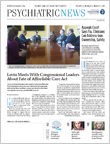“Bring me the real doctor!” my patient yelled at me within the first few seconds of our encounter. As an intern, I found that it is not uncommon to experience a patient’s bias for being a young physician. However, this patient insisted on refusing my care even after I had introduced myself, and he later became hostile. My mind immediately started racing, “Why me? Was it because of my race? My age? My gender?”
Perhaps the patient just reacted automatically to my youthful appearance and did not mean to target me personally. However, at that moment I was overcome with feelings of defenseless and a need to justify my role as his treating physician. “How do I prove myself worthy to be someone’s physician?,” I asked myself. Upon returning home to my husband, I started to tear up; I did not know what I had done to get such a negative reaction and feared the next encounter with that patient.
This is one example of the many kinds of discriminatory remarks that residents may encounter from patients. While we are in training to understand our patients, I believe we need to recognize how patients’ biases impact residents’ feelings of competency and sense of well-being.
As a minority resident, the magnitude of fear of patient bias has become even greater in our current social and political environment. Recently a clinical staff member made hurtful comments about my ethnic background and said that I don’t belong in this country. I was speechless; I felt vulnerable, scared, and insignificant. It crossed my mind that if staff members could make such comments, it was likely that patients might say or believe something similar.
When my fears didn’t dissipate, I became concerned that my feelings would impede my ability to learn and care for my patients, and I wondered how I could show my sincerity in wanting to help them while also dealing with the hurt of discrimination. I finally decided it was time to seek help. Initially, I did not know what to do. I felt that the hospital or my program would not be able to protect me from such prejudice. However, with my family’s and friends’ encouragement, I shared my experience. In retrospect, this was the best decision because I received a lot of support and was provided with resources to move forward. Here are some of the lessons that I learned that may be helpful to other residents who find themselves in a similar position:
•
Share your experiences of patient discrimination with colleagues you can trust, including your fellow residents, mentor, program director, and department chair.
•
Talk to residents or staff who have had similar experiences and ask how they handled them.
•
Access the employee assistance program.
•
Submit a formal incident report if patient discrimination raises workplace safety concerns.
•
Utilize methods to manage or reduce stress, including mindfulness-based techniques, nutrition, rest, and/or yoga.
•
Plan activities with friends, family, and colleagues and surround yourself with loved ones.
•
Participate in workshops that can help residents prepare for such circumstances through role-playing and rehearsal.
Reaching out and talking about my experiences comforted me and gave me a sense of safety, collegiality, and belonging. In fact, a 2015 survey of pediatric residents at Stanford University found that 15 percent of residents experienced or witnessed maltreatment from a patient’s family member. Fifty percent of those residents reported feeling unable to cope with these issues, and 25 percent believed no action would be taken by the hospital. The study included suggestions from various faculty members on how to address patient discrimination based on the physician’s race, gender, or religion. The top recommendations were to assess illness acuity, depersonalize an incident, and foster a positive therapeutic alliance with the patient.
Sometimes a patient’s bias can be reflected in something as simple as calling a female resident “Ms.” instead of “doctor.” But even such minor slights add up after a while and impact our perception of our patients. I hope that what I’ve written in this article will benefit other residents and let them know that they are not alone. I also hope to create workshops that discuss reconciliation and address the well-being of residents when facing patient discrimination. ■

